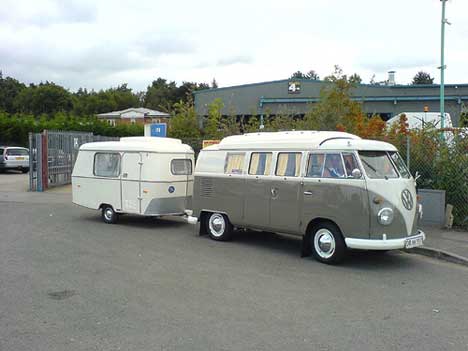
Photo by PJBert_2332
The National Caravan Council have launched a green caravanning website to encourange caravanners to go green, and to encourage non-caravanners to look at caravanning as a relatively low-emissions way of enjoying a UK or European holiday. The site compares the CO2 emissions of different combinations of car type and caravan size on four different popular routes and also has some handy tips for caravanners who want to lessen fuel consumption and CO2 output.
1. A perfect match – chose a towcar that is the right match for your caravan so you are not constantly changing gear. There are outfit matching programs used by caravan dealers to help you with this.
2. Watch your speed – towing at 40mph, where appropriate, will use much less fuel than when towing at 50mph (or more).
3. Lighten up – the more weight that you carry the more you have to accelerate and brake in speed changes.
4. Be cycle savvy – cycling when on holiday is a virtually zero emission way of getting around. But irregular-shaped items, such as bicycles, on a roof rack increases wind drag. Rear-mounted carriers are more energy efficient. (Don’t be tempted to carry them on a rack on the front of the caravan as this might adversely affect noseweight and the balance of your caravan.)
5. Box clever – the use of a profiled roofbox may enhance the aerodynamic properties of the towcar/caravan combination and reduce fuel consumption. Remove roof bars when not in use, otherwise solo consumption will be worsened.
6. Be a considerate caravanner – try to travel at less busy times. If caught in a traffic jam or causing a tailback, try to leave the road and allow the flow to stabilise. The ability to pull up and take time out is one of the major advantages for a caravanner and a goodwill gesture to other road users!
7. Turn off – switch off your engine if there is clearly no movement ahead – not just when towing.
8. Stop starting – in a long tailback, try driving slowly forwards in a low gear, thus reducing the need to brake and avoiding stop/start motoring. It’ll reduce brake and clutch wear, too.
9. Service station – ensure that your car and caravan are serviced regularly, so that both are in optimum condition.
10. No pressure? Check tyre pressures regularly – correct tyre pressures on your car and caravan reduce fuel consumption and prevent adverse tyre wear and handling problems.